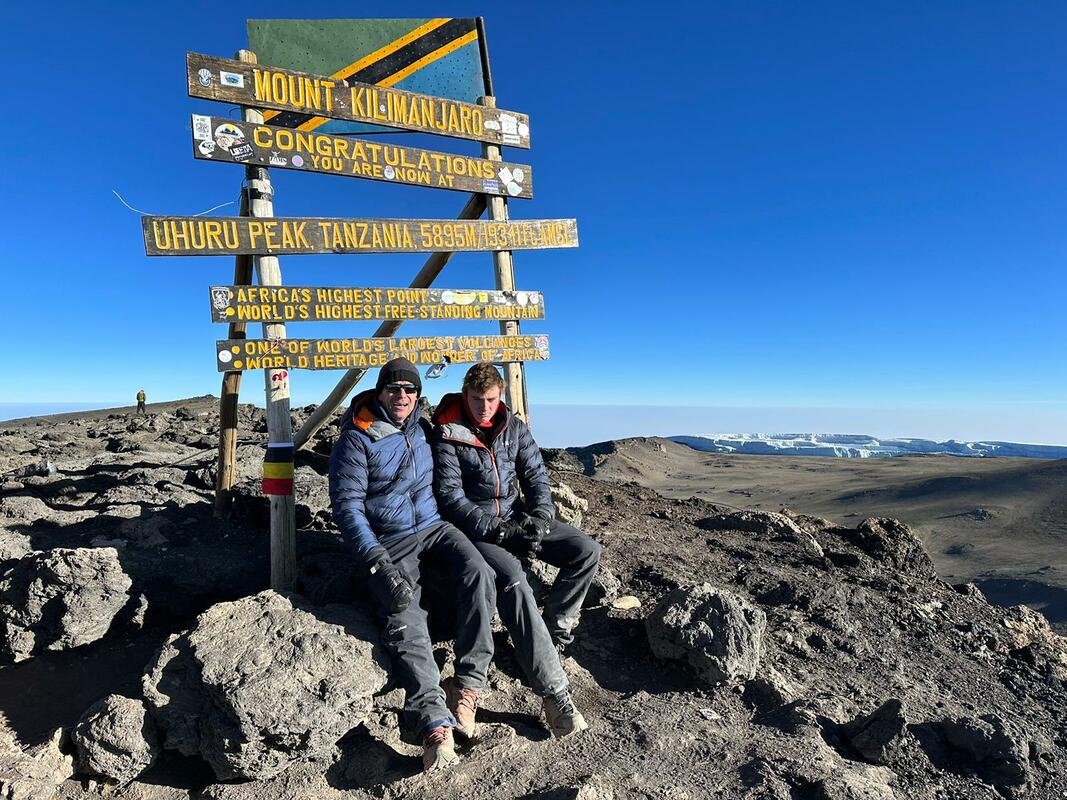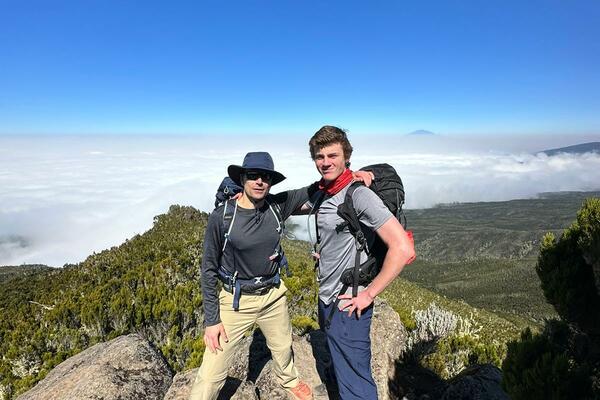
Peter Cockhill and his son, Roger Cockhill, recently climbed Kilimanjaro to raise money for RfLUK. Peter shares the story of their incredible journey.
It is often said that youth is infectious. Sitting in a comfortable chair in a pleasant pub with a full stomach and a glass of wine in hand, it was easy to respond “Why not? Let’s do it!” to the suggestion from my seventeen-year-old son Roger, that we should climb Mount Kilimanjaro. I know several people who have reached the summit of Kilimanjaro, including my (rather younger) partner, Milka. Although it is high (5,895 meters or 19,340 feet), it is the easiest of the Seven Summits (the highest mountains of each of the seven continents) and is a trek with a little rock climbing but with no need for ropes and real mountaineering skills. I was buoyed by Roger’s assumption, and Milka’s encouragement, that I was youthful enough, in body and mind, to join the ranks of summiteers. As with all states of mind, the easy optimism of our post-prandial conversation was fleeting and was soon replaced with other less sanguine states. I reflected that the last time I had slept under canvas was more than 35 years ago. “The past is a foreign country; they do things differently there” - L.P. Hartley’s famous opening line reverberated in my mind as my anxiety grew and the idea mutated from an idea into a looming reality.
The Air Oman flight from Doha to Kilimanjaro was filled almost exclusively with adventure tourists heading to the mountain or on safari. It was impossible not to compare myself, unfavourably, with the grizzled French mountain men, the youthful American sports jocks, the assorted hearty male, and female specimens from all over the Western world that were swathed in kerchiefs, and hiking pants, carrying rucksacks and seemingly full of optimism and vigour.
The following day we were at the Machame Gate in the foothills of Kilimanjaro. Our group consisted of five trekkers and fourteen support staff, the self-titled “G-team”. We were one of many groups starting out that day and the air was filled with the bustle of porters and trekkers eager to commence their ascent. The G-team was led by Suju, one of three guides who together with the chef formed the officer class of the support team and shared two two-person tents while the others slept in a single communal tent. Clemence and Hashim completed the leadership team and each day one of the two led while the other played sweeper, ensuring that no one fell behind.
It was a relief to discover that I was not the oldest of the trekkers, that distinction fell to Geoff, a semi-retired medical pilot from Australia. Andy, a landscape gardener from Preston in the north of England was a mixture of steely Northern hardness (he seemed almost invulnerable to cold) and class jester. Andy revelled in and reciprocated the friendliness of the Tanzanian porters from all different groups as they passed us each day rushing up the mountain to set up tents and toilets for their guests. “Jambo, jambo” and fist bumps galore. It was infectious. Eve, a young Canadian interior designer, was a quiet but receptive audience for Andy and Geoff as they each sought to interest her in their life stories. Roger was himself, easy-going company to all, but also self-contained with eyes and ears open to the wonder of the natural environment.
Two men in a two-person tent is one too many for comfort. As we unzipped the nylon flap and crawled into our orange pod on the first night, Roger announced that we should have a “no trumpeting” pact. He then immediately farted, laughed, and apologised. Like most pacts, it was no more substantial or long-lasting than the announcement of its existence.
The night sky was a daily delight. The clouds of the Milky Way gave depth to the immense darkness above us. Pixelated views of distant stars in the Universe. The constellations were perplexing, both familiar and different. Orion seemed to be stretched on its side, elongated, and pivoted to the right. Of course, we were now in the Southern Hemisphere. Geoff, who hailed from Western Australia and ensured that everyone was aware of this, guided our gaze towards the Southern Cross and spoke of it with an almost paternalistic pride.
Each evening on the mountain the sun would dip behind a ridge and the western horizon would glow a deep orange, irradiating light above the dark outline of the ridge, throbbing for a while before slowly fading into the encroaching darkness. Almost instantaneously the temperature slipped from cool to cold. Outdoor activity in the camp ceased. The stargazers retreated to their nylon cocoons to begin the nocturnal hibernation, while the G-team gathered in their large communal tent and provided a background hubbub of quiet conversation and the occasional burst of laughter. I had read before the trip that the campsites could be noisy. There was almost no background noise at night on the mountain and in its absence, all sound seemed to occur in the foreground. The sharp, stuttering, zipping sounds as other campers hefted themselves out of their tents for their nocturnal micturition triggered my nervous system to full alert. It was difficult to differentiate between here and there. Was someone entering my tent? Forewarned is forearmed, so I had brought foam earplugs which Roger and I squeezed into the openings of our auditory canals each evening. It seemed to me that the efficacy of the earplugs depended entirely on the placebo effect, which was an unfortunate thought as my scepticism was not buying the expectations that the brightly coloured cones of foam were selling. Lying in the sleeping bag, alert to the movements of others and anxiously wondering when I would have to leave the warmth to relieve myself, I worried that I would never fall asleep.
Sleep did finally come - every night. My restless head succumbed to the diurnal rhythm of the camp. We were each alone in our sleeping bags and in our heads, but we were also part of a larger organism which moved and rested in a free-flowing unison. Each morning before the dawn there was a quiet murmuring of movement as the support team rose to the tasks of the new day and pandered to the needs of their delicate clients. A soft voice at the tent offering a cup of instant coffee and dried milk to ease the transition from horizontal to vertical. After breakfast, all hands were engaged in packing, dismantling, and clearing our temporary settlement. We packed our bags and handed them to the porters, pulled our small rucksacks onto our shoulders and followed the leader into the new landscape that was awaiting us as we moved slowly around and up the enormous mountain.
“Pole, pole”, was one of a few phrases of Swahili that became a leitmotif of the ascent. “Slowly, slowly”. It was an advisory, an admonition and a way of living. Eager to demonstrate our physical prowess, and to push the parental boundaries set by our guides, we took turns trying to increase the pace of our walking ascent. Rather than hurry after us, our mountain mentors would simply repeat the phrase and languidly place one foot in front of the other, in a seemingly endless repetition of the action and phrase until our busy minds finally accepted their wisdom. It was a lesson in living. Suju, our team leader, was not to be rushed in anything. Each evening at dinner he would take readings of our oxygen levels and heart rates and would give us a briefing on the next day. He would not answer questions about the overall ascent. “One foot in front of the other, one day at a time”, was his response to any anxious enquiry as to what we might expect in the latter stages. Our mountain mentor was also a life mentor. Our attention is required here and now. The future will become the present, and when it arrives that future present shall be where we exist. Why worry about imaginings? So, for the most part, I did not. It was a powerful realisation that one could spend hours without thinking. Placing one foot in front of the other, breathing, listening, smelling, feeling and observing.
After the second day, we were above the clouds and the brightness of the day showed the landscape in full sharp relief. Light, shadow, penumbra. The cold of the early morning was replaced by warm air as the sunlight bounced off the rocks and the ground warmed. Whenever I removed a layer of clothing, I learned to keep it close as it would shortly be required again as the wind, the undulating ground and the shadows created endless microclimates. Sweat was licked away by the wind, followed by a brief chill and the addition of another layer of clothing and then the sweating would begin again. And so it continued each day, as additional layers of dust and dirt settled into the creases of my skin and the recesses of my nose, ears and mouth where they would remain until we left the mountain.
Five nights and six days on the mountain. Looking back, it seems such a short period, but it was not experienced as such. It was a wonderful experience of alignment with, and participation in, the magical, overwhelming beauty and complexity of life. I was amazed by the scale of the landscape and was reminded each night that we are living in but a tiny fragment of an unimaginably large universe. The final ascent was not easy. Roger and I both suffered the effects of altitude sickness and struggled. At times, I forgot to focus on placing one foot in front of the other and allowed my thoughts to run ahead in a reversion to the anxiety that preceded the trip. Finally, we reached Uhuru Peak, the summit of Kilimanjaro after an eight-hour trek through the night. I made it because I was guided by and provided for, by the G-team and their compatriots. It was a humbling experience which was suffused with the kindness and generosity of spirit of our hosts. At the summit, I was overwhelmed with emotion and cried with abandon. The landscape and people had given me so much. It was an immense privilege to feel so alive. Thank you, Roger and thank you, Milka for inspiring me.


